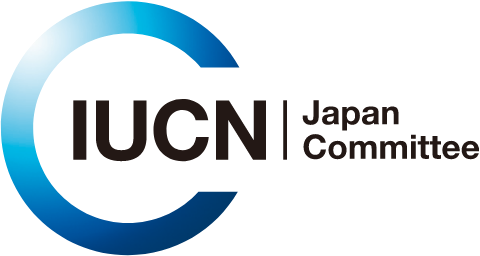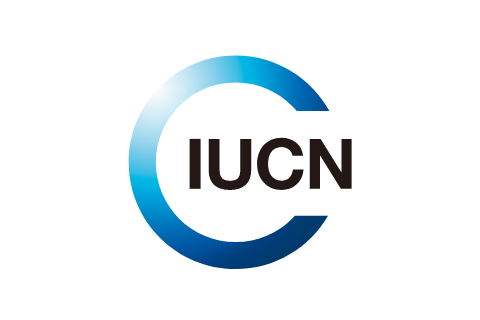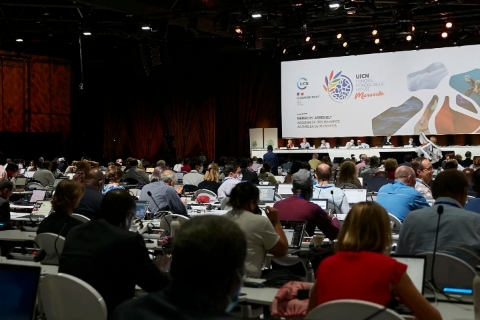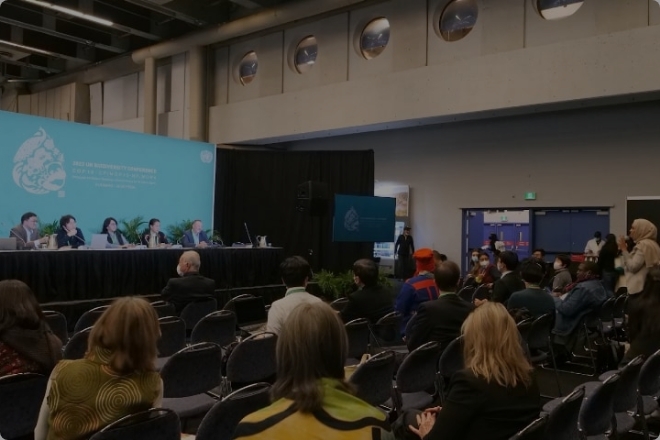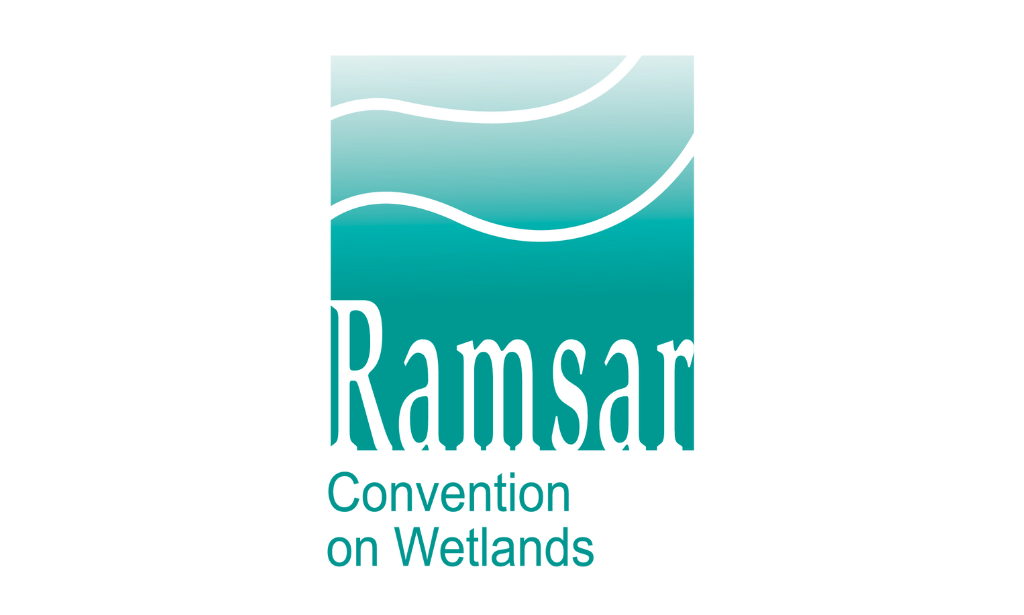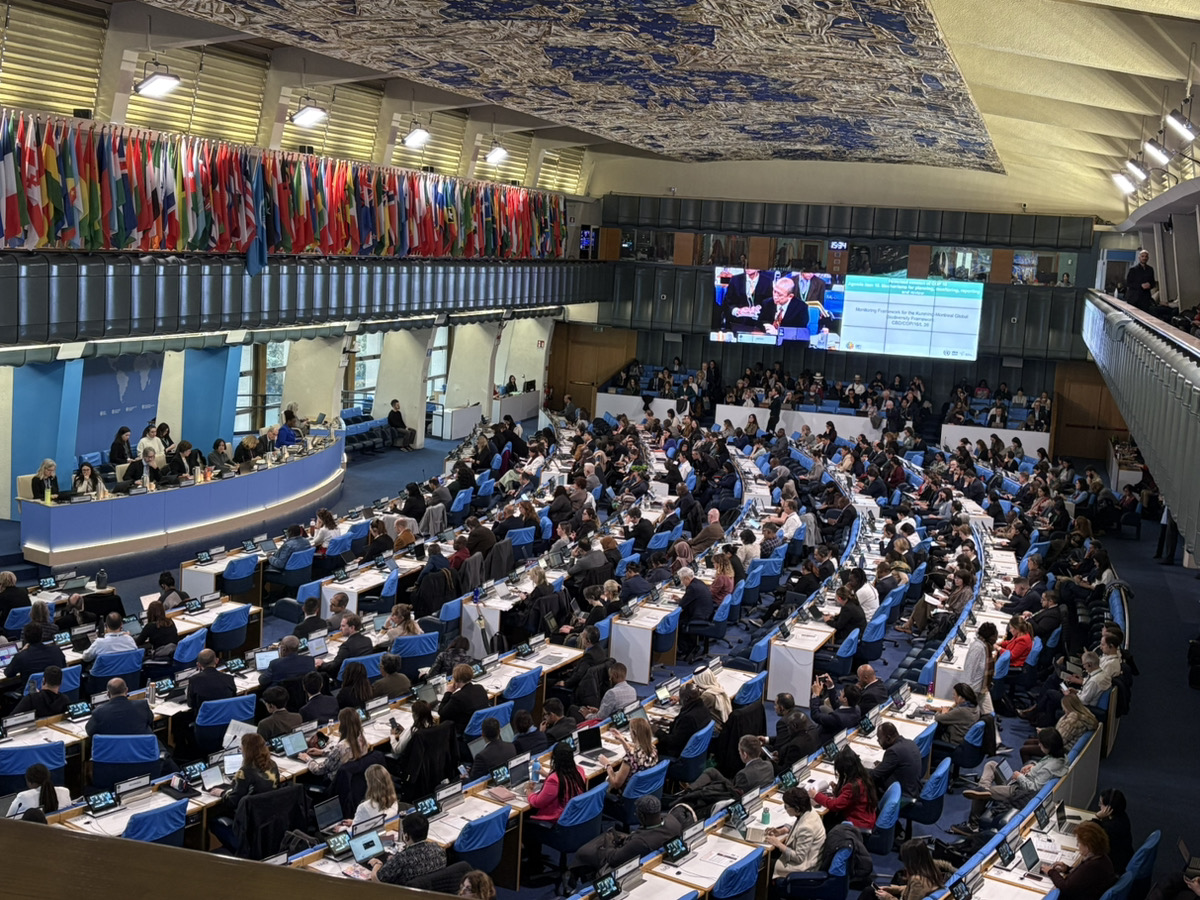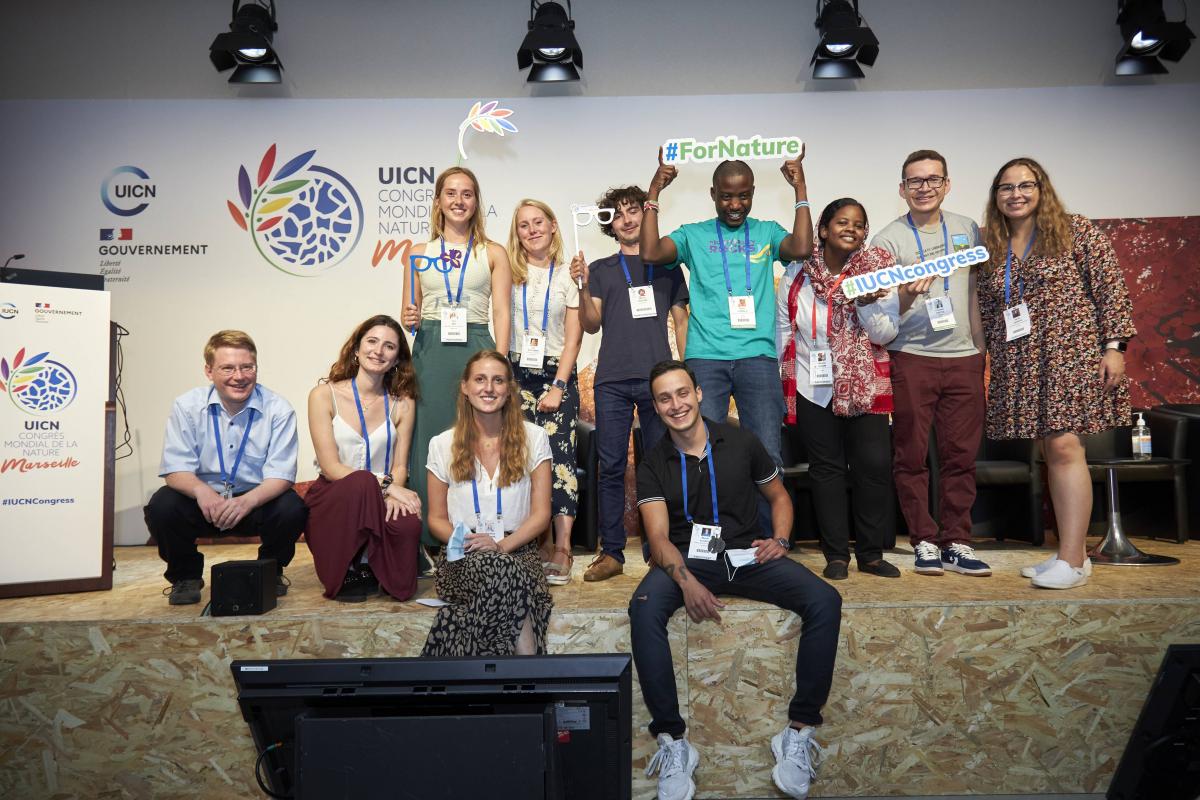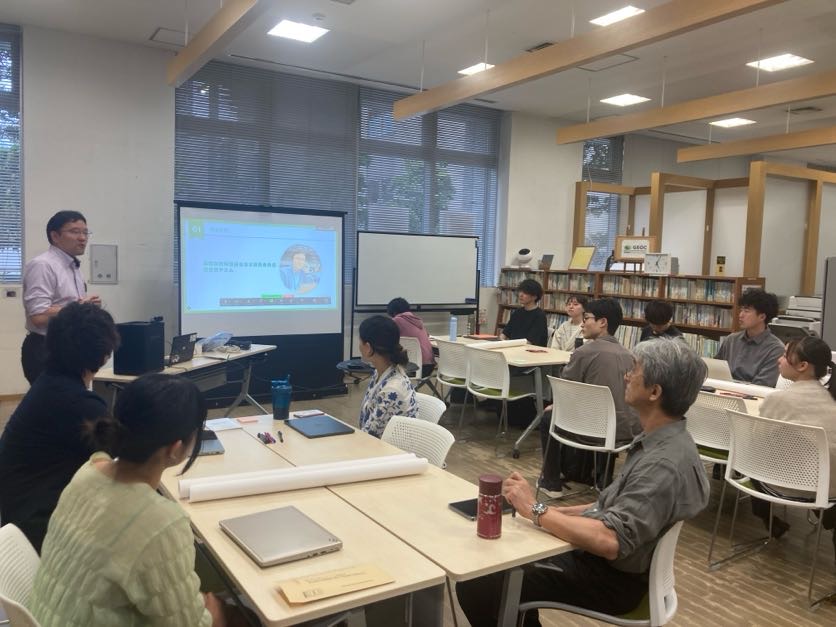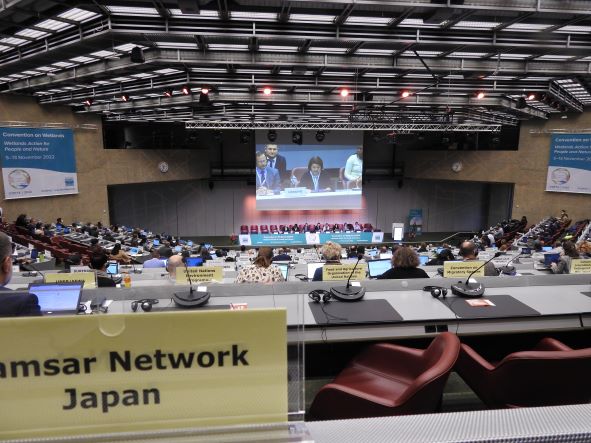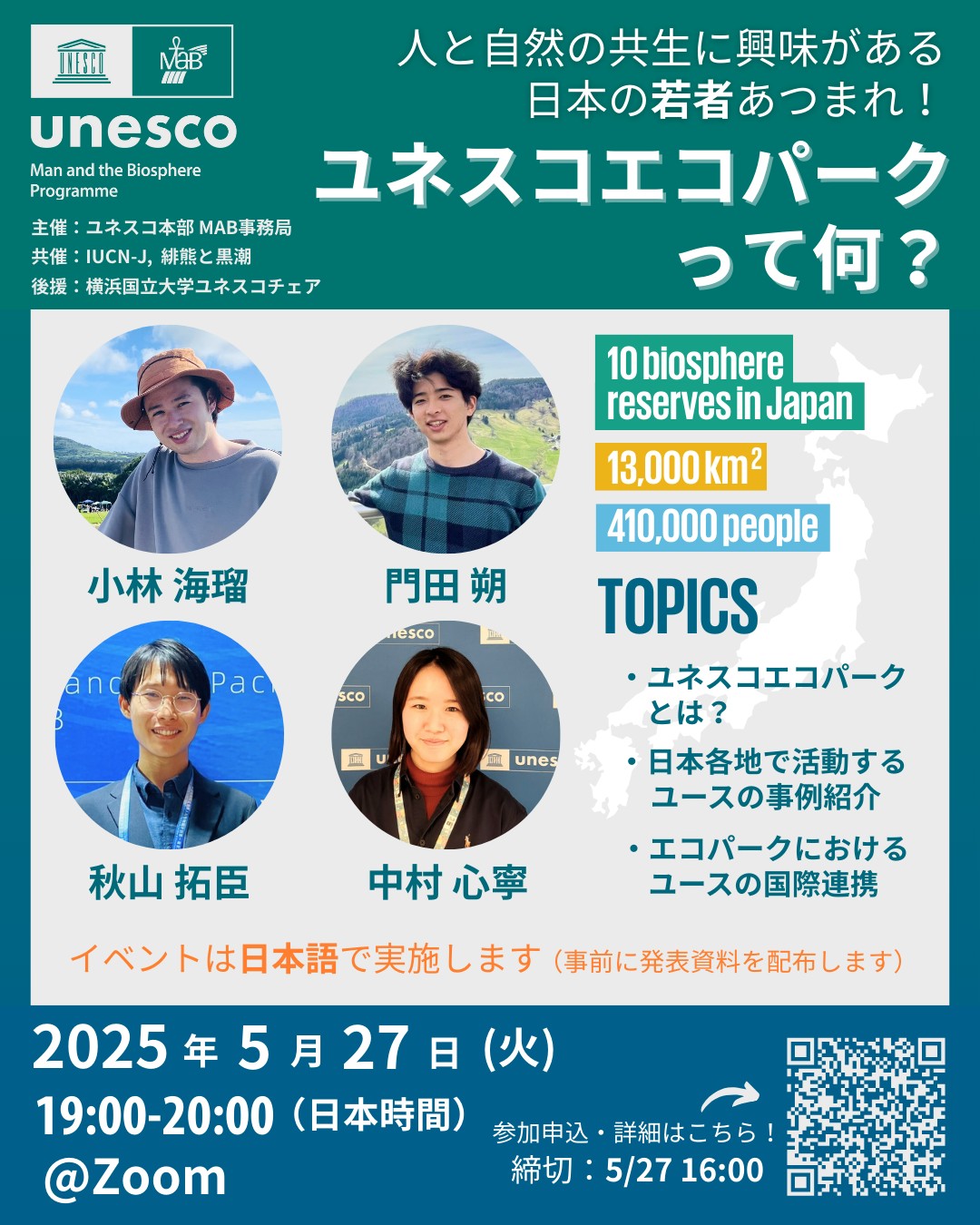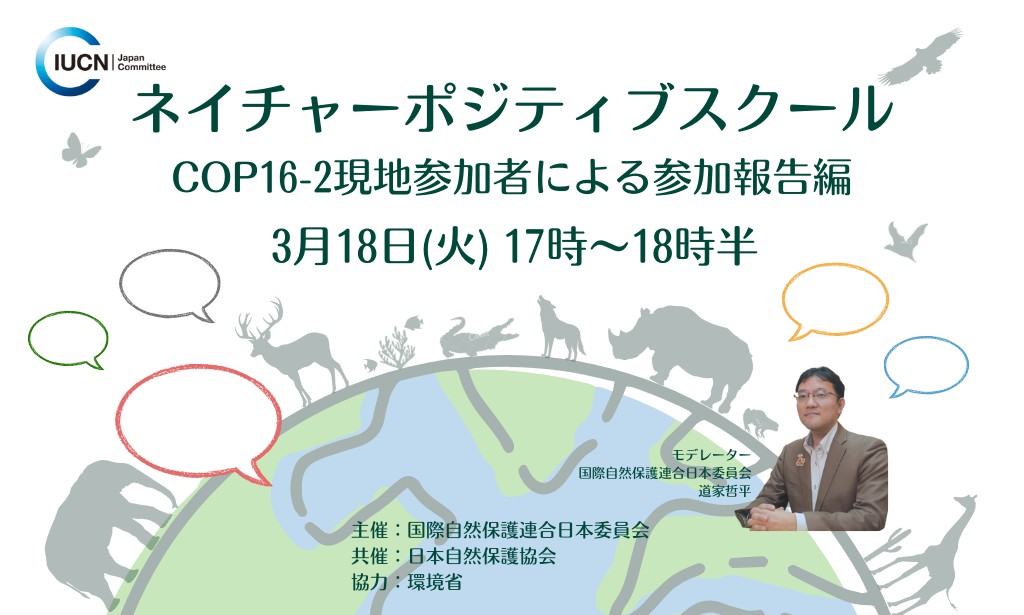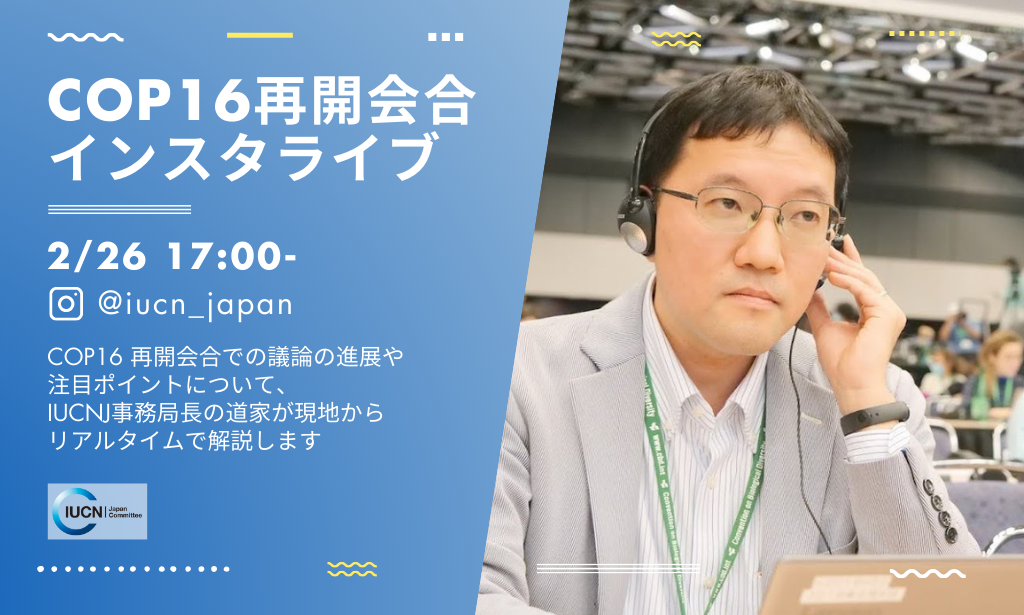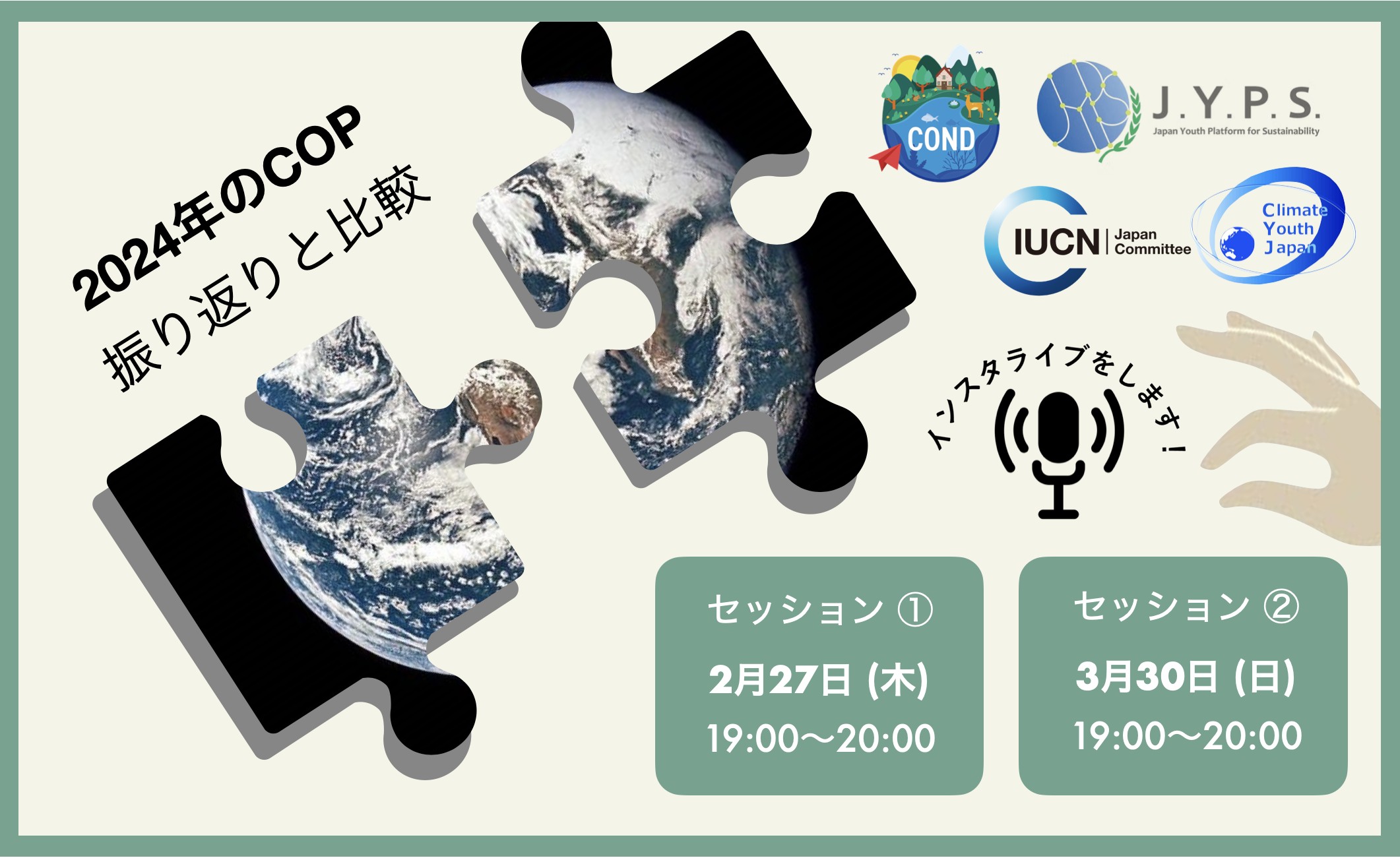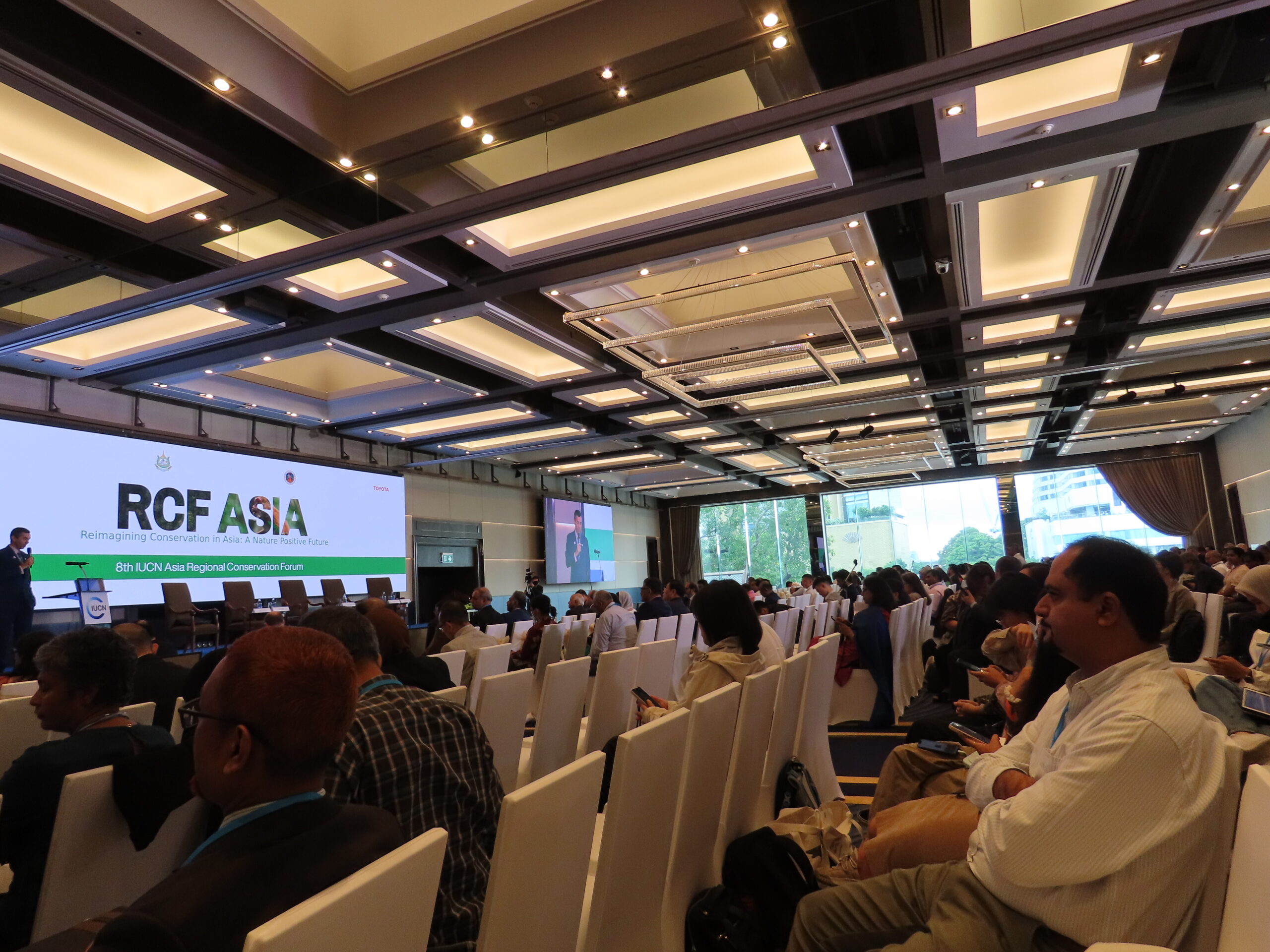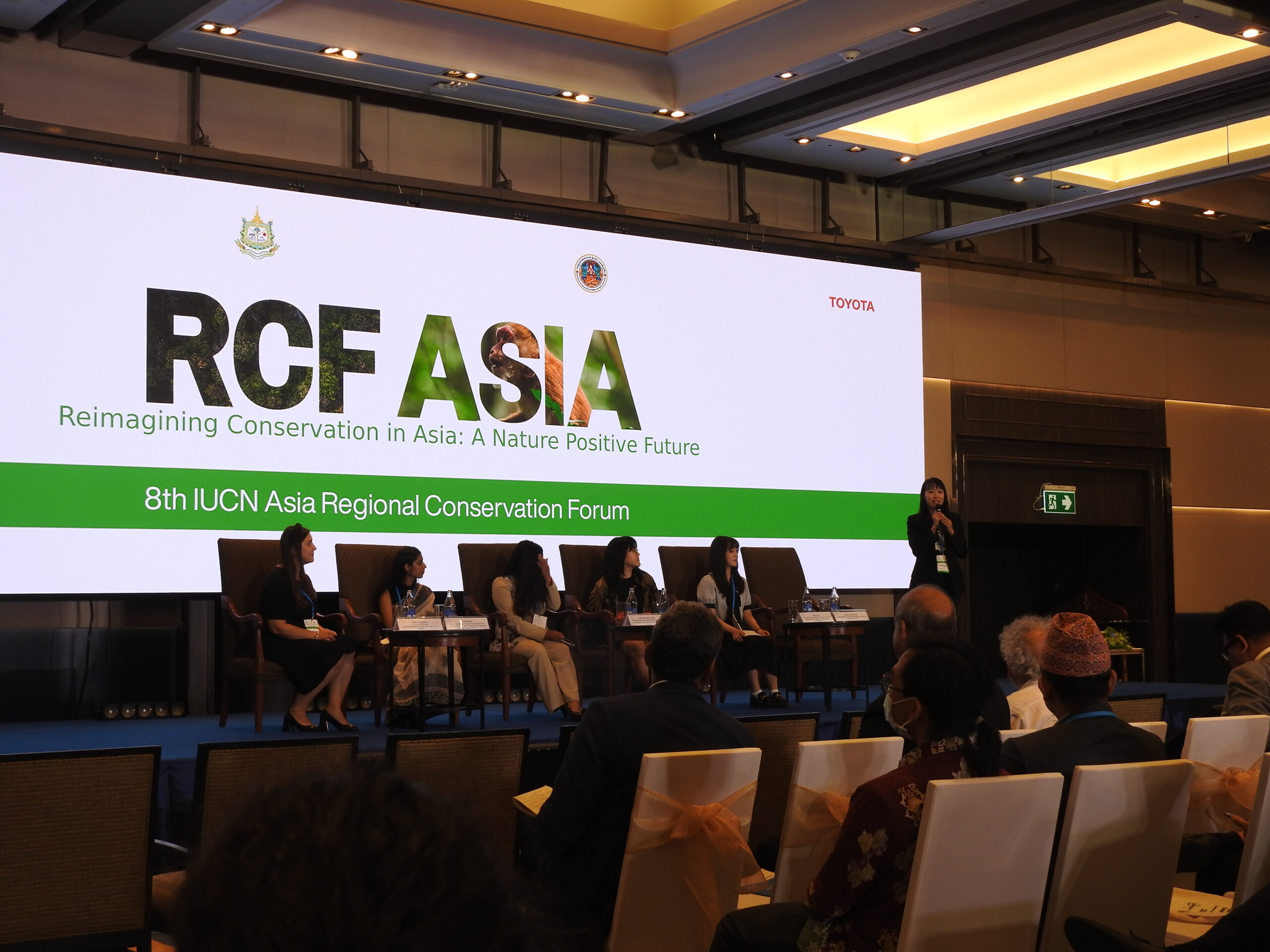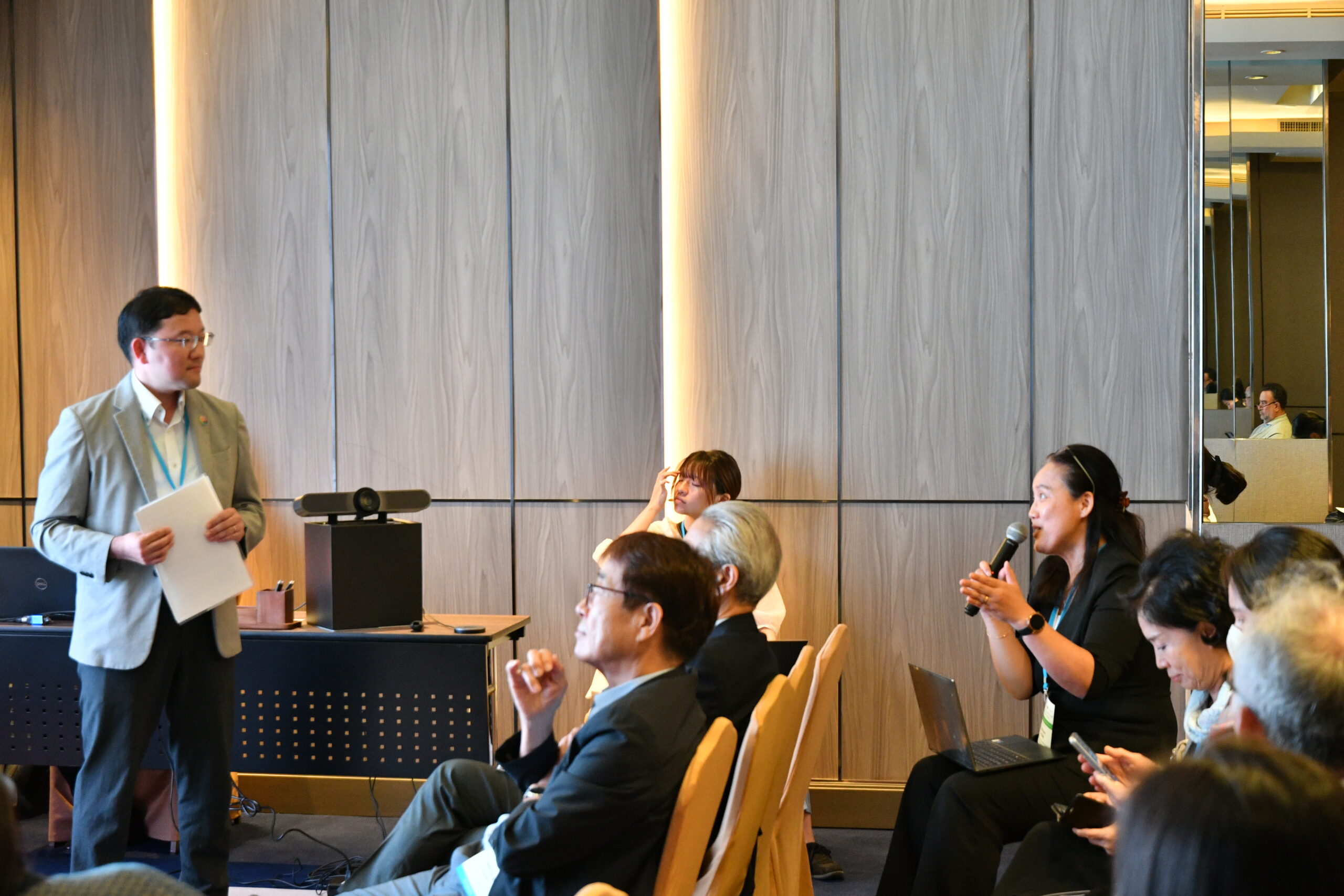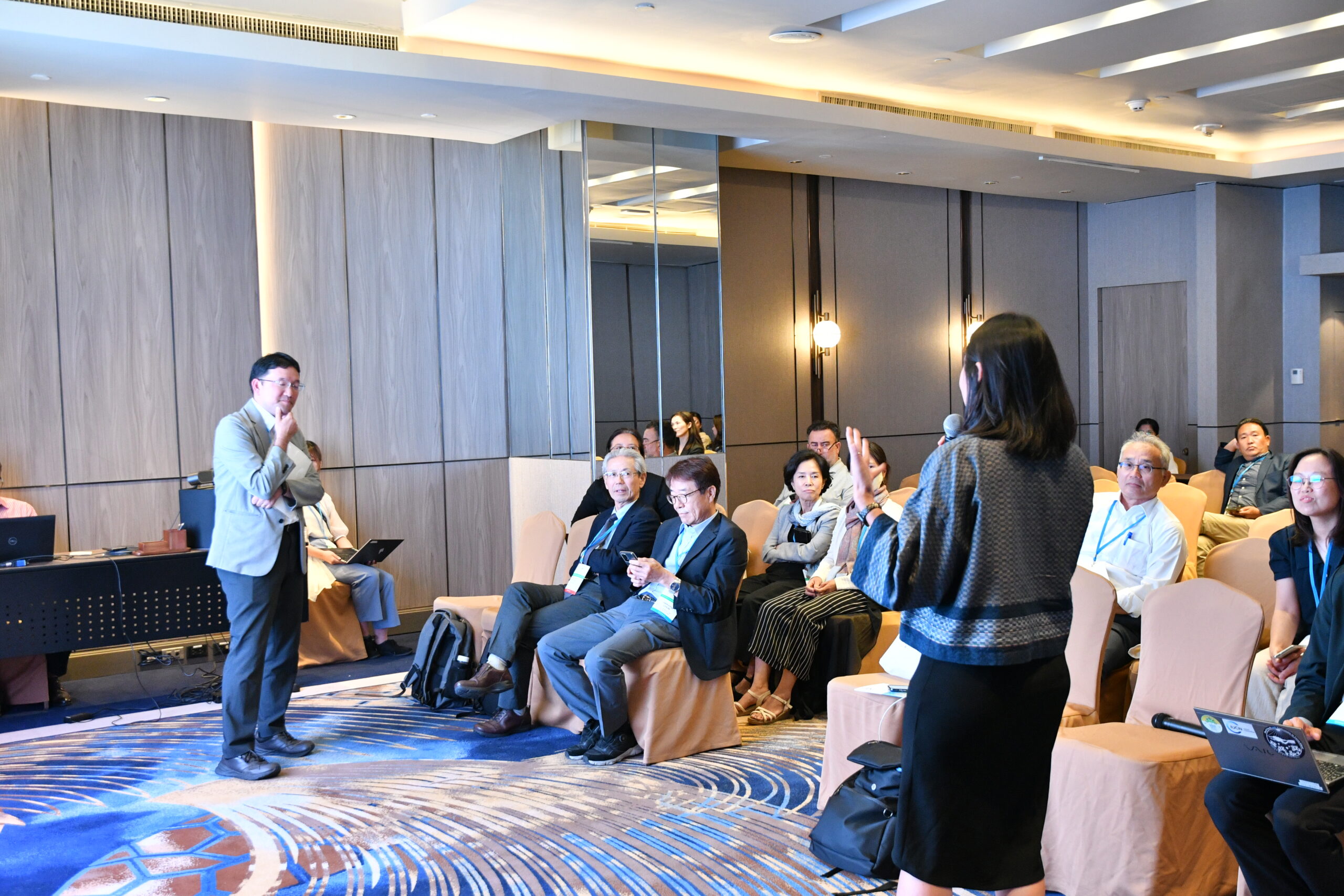
IUCN日本委員会は、IUCN韓国委員会、日本自然保護協会、韓国生態学研究所と共にサイドイベントを開催しました。テーマは「アジアからのIUCN-ビジネスコラボレーションの強化」です。プライベートセクターとのコラボレーションが注目を集める中、このイベントは企業活動と自然保護の取り組みについてどのように協働していくかを議論しました。
イベントは、IUCN日本委員会の道家哲平さんの司会進行で始まり、続いてIUCN韓国委員会のチョン・ジェギュンさんによる開会の挨拶が行われました。ビジネス分野におけるCSR(企業の社会的責任)からCSV(共有価値の創造)への移行についてのトピックも出てきました。また、経団連自然保護協議会からのビデオメッセージも届けられました。
講演では、星野一昭さんが20年間の戦略ビジョン案を簡単に説明し、強調すべき重要なポイントを指摘しました。
発表では、日本自然保護協会(NACS-J)は日本における自然保護のための民間セクターとの協力事例を紹介し、韓国生態学研究所はTNFD(自然関連財務情報開示タスクフォース)が韓国企業に与える影響について発表しました。
また、本イベントでは、主催者と参加者の間で議論を促進するためにSlidoを使用し、参加者との意見交換の場を重視しました。
最初の質問は、「次の内容についてどう思いますか?; IUCNアジアコミュニティ(メンバー、委員会、事務局)は、アジア地域のネイチャーポジティブな未来のためにビジネスおよび金融セクターと関わるべきである」でした。
約73%の参加者が「強く同意する」と答え、20%が「やや同意する」、7%が「どちらでもない」と回答しました。
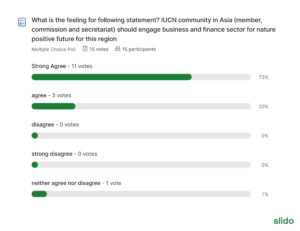
参加者は、IUCNとの協働はますます重要になっていると指摘し、ネイチャーポジティブなアジェンダを支持する必要があると共有しました。また、民間企業や金融セクターは社会の重要な一部であり、現行の社会システムを再構築する上で重要な役割を果たすと話していました。
ある参加者は、協働にはさまざまなタイプがあることを指摘しました。「例えば、それぞれの発表で示されていたことでいうと、日本の取り組みはローカルレベルでのボトムアップ型であり、韓国のプロジェクトはトップダウン型のアプローチになっています。コミュニティベースの協力と制度的アプローチの両方が不可欠です」と話していました。
もう一つの質問は、「アジアにおけるIUCN–ビジネスコラボレーションを強化するために重要なキーワードは何ですか?」です。
回答では、コミュニケーション、持続可能性、信頼構築が強調されていました。ある参加者は、一部の企業がこの協働をグリーンウォッシュの機会として利用する可能性があると懸念を指摘し、全ての関係者が同じ方向性を持つことを確認する必要があると話しました。また、持続可能な資金調達が重要であり、助成金や政府の支援が今後の活動に大きな影響を与えると話していました。さらに、ある参加者は、長期的なコラボレーションには持続可能なアプローチが必要であるとし、具体例として、企業が協力を申し出たものの、契約が1年だけであり、そのプロジェクトの意義に疑問を感じた という話を共有しました。
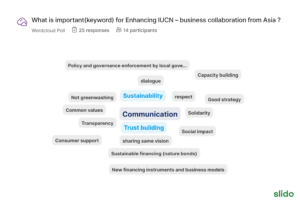
‘企業が10年間投資するためには何が必要か?’
IUCNと民間セクターとの連続的な関係を構築するためには、モニタリングと評価のプロセスが重要です。また、民間セクターとのコミュニケーション、特に専門用語についても課題として挙げられました。
企業はIUCNと同じ知識やビジョンを必ずしも共有しているとは限らないため、オープンな対話が重要だと感じています。
総じて、国際ビジネス法を学ぶ学生として、この議論は非常に興味深いものでした。IUCNは自然保護に特化した専門グループですが、今日では多くのセクターとの協力が強調されています。IUCNアジア事務所所長のディンドさんが話していましたが、ビジネスとの協働において、効果的なコミュニケーション、特に特定の用語やセオリーを異なる文脈や場面に合わせて戦略を立てることが今後の焦点になってきます。
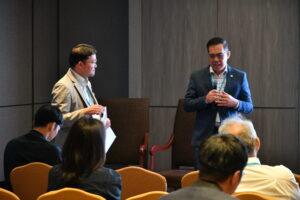
さらに、本サイドイベントの参加者は主に北東アジア諸国が多い印象でした。IUCNはアジアを南アジア、北東アジア、東南アジアの3つの地域に分類しています。参加者の所属等を踏まえると、このセッションは主に北東アジアの参加者で構成されていました。ビジネスとの協働というテーマだったからなのか、同時に行われたサイドイベントとのほうが関心が高かったからなのか、このような現状を見ると、アジアとしては1つの地域であるものの、自然保護に関する関心や価値観が多様であると再認識しました。
東アジアは他のアジア諸国に比べて経済的により進んでいるというコメントをほかの参加者からよく耳にしました。私は、3日間のイベントの中で、様々な国籍の参加者に、「日本の環境政策をどう思うか」という問いをしました。しかし、「わからない」「経済的に進んでいる国だから、あまり問題はないのではないか」といった答えが返ってきました。裏を返せば、ビジネスとの協働における優良事例をつくることができれば、それが他の国々を正しい方向に導くコンパスとしての役割を果たす可能性をもつと思います。
少しでも、日本の立場から、アジアの保全に貢献できるようにアクションを起こしていく必要があると強く感じました。
田村双葉
Day 2: Enhancing IUCN- business collaboration from Asia
IUCN Japan held a side event with IUCN Korea, the Nature Conservation Society of Japan and Korean Institute of Ecology. The theme was ‘Enhancing IUCN- business collaboration from Asia’. With increasing attention on collaboration with the private sector, the event provided a platform to discuss how to align corporate activities with conservation efforts.
The side event began with Teppei Dohke serving as a facilitator, followed by an opening remark from Chun Jaekyun of the Korean National Committee for IUCN. He touched on the ongoing transition in the business field from CSR (Corporate Social Responsibility) to CSV (Creating Shared Value). Additionally, a video message was delivered by the Keidanren Nature Conservation Committee.
As the keynote speaker, Kazuaki Hoshino briefly explained the draft 20-year strategic vision, highlighting key points that should be emphasised.
During the presentations, NACS-J shared how Japan collaborates with private sectors for nature conservation, while the Korean Institute of Ecology presented on the impact of the Task Force on Nature-related Financial Disclosures (TNFD) on South Korean businesses.
The event emphasised audience engagement with Slido to facilitate interactive discussions between the hosts and participants.
The first question posed was ‘what is the feeling for following statement; IUCN community in Asia (member, commission and secretariat) should engage business and finance sector for nature positive future for this region?’
Approximately 73% of respondents strongly agreed, 20% somewhat agreed, and 7% neither agreed nor disagreed.

Participants shared the view that it is increasingly important to engage with IUCN and support a nature-positive agenda. They noted that private businesses and the finance sector are integral parts of society and play a key role in reshaping the current social system. One participant pointed out that there are different types of engagement; for example, Japan’s initiative is bottom-up at the local level, while Korea’s project follows a top-down approach illustrated in each presentation. Both community-based cooperation and institutional approaches are essential.
Another question asked was ‘what is important (keyword) for Enhancing IUCN – business collaboration in Asia?’
The responses highlighted the importance of communication, sustainability, and trust-building. One participant expressed concern that some companies might use the collaboration as an opportunity for greenwashing and emphasised the need to ensure that all parties are aligned. As another point, sustainable financing was cited as crucial with subsidies and government support having a significant impact on collaboration. Additionally, sustainable approach is required for long term collaboration. A participant shared a story about a company that approached them for cooperation but offered only a one-year contract, raising doubts about the project’s meaningfulness. Monitoring and assessment process should be key to establishing a consecutive relationship between IUCN and the private sector. Another challenge discussed was how to communicate with private sectors particularly regarding terminology.

What motivates a company to invest for 10 years?
Since companies may not share the same knowledge and vision, it’s important to have open conversations.
All in all, as a student of International Business Law, I found this discussion fascinating. IUCN is a professional group specialising in conservation, but today we need to collaborate with multiple sectors. Effective communication, including translating specific terms into language that resonates within different contexts, is essential. As Dr Dindo Campilan, IUCN Regional Director for Asia and Hub Director for Oceania mentioned we need to elaborate business engagement strategy. Given mainstreaming biodiversity in economic and financial sectors, We need to take into account what is effective in the specific local context and situation.

Furthermore, the audiences are mainly from Northeast Asian countries. IUCN categorise Asia into 3 regions: South, Northeast and Southeast Asia. From my perspective, this session consisted primarily of participants from Northeast Asia, which highlighted that, although Asia is one region, we have diverse interests and values concerning conservation. During the three-day event, I asked participants of various nationalities what they thought about Japan’s environmental policies. However, the responses I received were mostly along the lines of ‘I’m not sure’ or ‘Since Japan is an economically advanced country, there probably aren’t many issues.’ On the flip side, this suggests that if we can develop valuable case studies in collaboration with businesses, they could serve as a compass to guide other countries in the right direction.
I strongly felt the need to take actions, even in small ways, to contribute to conservation in Asia from Japan’s standpoint.
Futaba TAMURA
